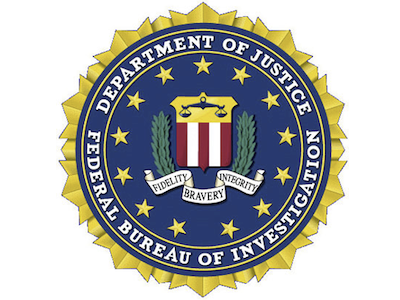FBI's Warrantless Searches Now Include Fake Cell Towers
Naturally, the FBI insists this is completely legal.


The FBI has made use of a novel technique to locate an criminal suspect that may constitute a violation of the American Constitution. At least, that's the charge made by Daniel David Rigmaiden, alleged leader of an identity theft ring who was located by using a fake cell phone tower to track down an aircard he was using. The fake tower - a device called Stingray - tricks wireless devices to connect to it by spoofing legitimate cell phone towers, attracting phone signals before passing them back to legitimate towers to evade detection. Stingray is then able to collect information like unique ID numbers and location data. This allows for a much more precise location fix than is obtainable using legitimate cellphone towers.
The FBI has previously insisted that they don't need a warrant to conduct utilize the technology. There may be some merit to that claim, considering the brazenly irresponsible granting of retroactive immunity to previous warrantless wiretapping campaigns. But they are now changing their argument somewhat, surprisingly claiming in Rigmaiden's case that Stingray's use did indeed constitute a lawful search. The use of Stingray, so they claim, was actually covered under a warrant they already obtained to get location, ID information and traffic data from existing Verizon towers. This may be, as Wired notes, an end run to avoid a deeper look into Stingray technology that may cause it to come under serious legal scrutiny.
The FBI claims the device is designed only to grab information like "dialing, routing and address" data as part of a suspect's routine communication. However, they can't use it to precision-target, which means Stingray is also collecting data on innocent people. Though the FBI is required by Internal Policy to discard such irrelevant data, the American government's official position is that, similar to someone's trash, the 4th Amendment's expectation of privacy doesn't apply to data gathered from stray wireless device signals. Though the argument is, to put it mildly, logically suspect, it has some basis in unfortunate legal precedent. In January, 2011, the California Supreme Court ruled, shockingly, that police may search the contents of an arrested person's cell phone. In September, the California legislature passed a law overturning that ruling, but Governor Jerry Brown vetoed that law.
Wired has posted the full affidavit in PDF form, and it's worth a read to anyone interested in the latest attempts to finesse certain constitutional principles.
Sign up to get the BEST of Tom's Guide direct to your inbox.
Get instant access to breaking news, the hottest reviews, great deals and helpful tips.

Ross is a former contributing writer for Tom's Guide based in Los Angeles covering phones, tablets and home networking. Ross has previously written for Deadline, The Los Angeles Times and, most recently, TheWrap.
-
drwho1 Going after known criminals is OK by me.Reply
But randomly collect data from everyone is NOT OK.
-
nukem950 So after working for a cell phone company and dealing with law enforcement, I really do not see why they cannot just use the records they get from Verizon.Reply
If it is anything like the company I worked for (way cheap on the tech they used), then they should have the tower the cell phone uses, if not more information. -
syrious1 total BS, the government needs to learn that people have rights and they should not be broken just because you have the technology and the legal preceidence to do so.Reply -
ewood while im for them going after criminals they should do it 120% by the book. its a slippery slope if we bend the rules to catch people who break the rules.Reply -
alidan syrious1total BS, the government needs to learn that people have rights and they should not be broken just because you have the technology and the legal preceidence to do so.Reply
im going to ask a few simple questions.
do you pay taxes?
do you own a car and drive it?
do you own land?
do you own a home?
with taxes, even if you are off by 1 cent you can go to jail, and taxes are so needlessly complex than no one can be sure they payed everything.
with a car, i have talked to cops, every car on the road is violating at lest 1 thing that they can pull you over for, its just knowing what it is to look for.
with land and a home, the government can fairly easily find at least one thing on either the land or in the home that would effectively make it uninhabitable unless you pay through the nose, or possibly cant even build on the land.
now, are you going to seriously go after the government and risk federal prison, or even just having your life turned upside down by them?
for a long time the govenment doesnt give a damn about the person
cops stopped working for the people around the same time we stopped being citizens and became civilians.
do you really think they wouldn't? only reason they don't go after you en mass right now for the above is because it keeps you in line. if you started any kind of anti government movement that gained traction, i guarantee you would wouldn't come out unscathed. as no mater who you are, or what you fight for, tax evasion isn't something that really calls followers, and even if you are off by 1 penny, you know its the label you would get. -
beenthere If people really believe they are losing some God given right, I suggest you not use your cellphone or move to China and see what it's like to actually lose your civil rights.Reply -
ewood alidanim going to ask a few simple questions. do you pay taxes?do you own a car and drive it?do you own land? do you own a home?with taxes, even if you are off by 1 cent you can go to jail, and taxes are so needlessly complex than no one can be sure they payed everything. with a car, i have talked to cops, every car on the road is violating at lest 1 thing that they can pull you over for, its just knowing what it is to look for. with land and a home, the government can fairly easily find at least one thing on either the land or in the home that would effectively make it uninhabitable unless you pay through the nose, or possibly cant even build on the land. now, are you going to seriously go after the government and risk federal prison, or even just having your life turned upside down by them?for a long time the govenment doesnt give a damn about the personcops stopped working for the people around the same time we stopped being citizens and became civilians. do you really think they wouldn't? only reason they don't go after you en mass right now for the above is because it keeps you in line. if you started any kind of anti government movement that gained traction, i guarantee you would wouldn't come out unscathed. as no mater who you are, or what you fight for, tax evasion isn't something that really calls followers, and even if you are off by 1 penny, you know its the label you would get.Reply
my anti government movement/statement is living in VT and looking out for myself. I dont rely on the government for much besides passable roads and surplus ammo
-
bobusboy I think it was george carlin who pointed this out but:Reply
You have no rights.
If you don't believe me then go to wikipedia; and in the search box type in Japanese Americans 1942 and see what comes up.
Rights, aren't rights if some one can take them away.
As for an expectation of privacy or a right to privacy you're in public, IMO if they'd have to subpoena the information from the services provider then they should need a warrant to collect singal data before it reaches the provider.
